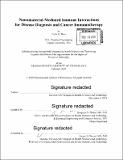Nanomaterial-mediated immune interactions for disease diagnosis and cancer immunotherapy
Author(s)
Buss, Colin G.
Download1199299637-MIT.pdf (15.86Mb)
Other Contributors
Harvard--MIT Program in Health Sciences and Technology.
Advisor
Sangeeta N. Bhatia.
Terms of use
Metadata
Show full item recordAbstract
The body's natural defenses against disease,facilitated by a complex and highly-evolved immune system, eluded the scientific community's understanding for thousands of years following its first description. It wasn't until the mid to late 1900s that we were able to begin robustly describing the mechanisms through which innate and adaptive immune responses function, but numerous revolutionary discoveries over recent decades have since facilitated meaningful clinical advances impacting innumerable lives. From diagnostic techniques for the characterization of disease, to immunotherapies for their treatment, much of modern medicine can trace its roots to the study of immunology. Yet despite advances in immunological knowledge and its clinical applications, much remains to be understood, and many such applications have major limitations. Mechanisms by which to interface with the immune system have thus generated immense interest, and nanotechnologies have emerged as useful tools in pursuit of this goal. Decades of research in a variety of applications have facilitated our capability to exquisitely engineer nanoparticles to incorporate desirable characteristics, allowing us to utilize these unique materials for the study and modulation of immunological activity. The work in this thesis aims to contribute understanding of the role of immunity in disease by using nanoparticle technologies that interact with the immune system to diagnose, monitor, and treat disease. First, we engineer a set of nanoparticles responsive to infection-associated proteolysis driven by the innate immune response to a pathogen as well as by the pathogen itself. We demonstrate that detection of such proteolytic activity allows for the diagnosis of disease and monitoring of its progression as an immune response mounts, and following therapeutic treatment. Then, we design a separate nanoparticle system to deliver immunostimulatory oligonucleotides for cancer immunotherapy. This technology greatly enhances the activity of a model immunostimulant, suppressing tumor progression and powerfully potentiating immune checkpoint inhibitor antibody treatment, all while greatly reducing the dose of immunostimulant required to have such effects. Together, this work elucidates mechanisms by which nanomaterials can be utilized to interface with the immune system for the detection and modulation of its activity, thereby achieving sensitive and specific disease diagnosis and powerful tumor suppression.
Description
Thesis: Ph. D., Harvard-MIT Program in Health Sciences and Technology, 2020 Cataloged from PDF version of thesis. Includes bibliographical references (pages 107-129).
Date issued
2020Department
Harvard University--MIT Division of Health Sciences and TechnologyPublisher
Massachusetts Institute of Technology
Keywords
Harvard--MIT Program in Health Sciences and Technology.